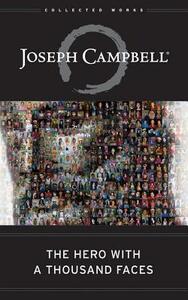Take a photo of a barcode or cover
Anthropology and religious studies tend to be pretty dense subjects for the layperson, so Campbell provides a great service in elucidating in clear terms a central aspect of cultural evolution - and how the heroic quest myths are entwined in religious belief.
challenging
slow-paced
challenging
informative
inspiring
slow-paced
emotional
hopeful
informative
inspiring
reflective
fast-paced
This is one of the most influential books ever written and has inspired countless writings and writers.
Reading this was quite an experience. I'm left with quite a few feelings and impressions.
As someone with a deep passion for mythology and epic storytelling, this book has been obvious required reading for me, though it took me a while to finally get around to it.
And honestly, I'm glad I read it right when I did. I don't think I would have appreciated it as much if I read it any time in the past. Today I had the right combination of familiarity with various world myths, basic comfortability with philosophy, and a very recent obsession with story structure (the Hero's Journey of course being the most famous form) that I was able to really absorb this book and get a lot out of it.
I did read this with some skepticism, too. There are times when I felt Campbell took leaps; some arguments felt like a stretch, some insights felt less like analysis and more like over-analysis.
But I don't think the few stretches here and there harm the book overall. I was surprised at just how flexible Campbell's theory is; in all my previous encounters with the Hero's Journey, it felt rather rigid. A character goes through such and such a number of steps, and never skips one. But Joseph Campbell, the originator of the Hero's Journey, doesn't seem to argue that at all.
Instead, Campbell outlines a rather loose archetypical structure that I find far more compelling. I've seen many people say that his journey excludes female or feminine heroes, and that I also disagree with; there is plenty of room within his framework for women, and he demonstrates this numerous times.
Overall, this book has led me to a tremendous amount of thinking, and arguably a paradigm shift or two. I definitely feel I will continue to think about it for a while.
As someone with a deep passion for mythology and epic storytelling, this book has been obvious required reading for me, though it took me a while to finally get around to it.
And honestly, I'm glad I read it right when I did. I don't think I would have appreciated it as much if I read it any time in the past. Today I had the right combination of familiarity with various world myths, basic comfortability with philosophy, and a very recent obsession with story structure (the Hero's Journey of course being the most famous form) that I was able to really absorb this book and get a lot out of it.
I did read this with some skepticism, too. There are times when I felt Campbell took leaps; some arguments felt like a stretch, some insights felt less like analysis and more like over-analysis.
But I don't think the few stretches here and there harm the book overall. I was surprised at just how flexible Campbell's theory is; in all my previous encounters with the Hero's Journey, it felt rather rigid. A character goes through such and such a number of steps, and never skips one. But Joseph Campbell, the originator of the Hero's Journey, doesn't seem to argue that at all.
Instead, Campbell outlines a rather loose archetypical structure that I find far more compelling. I've seen many people say that his journey excludes female or feminine heroes, and that I also disagree with; there is plenty of room within his framework for women, and he demonstrates this numerous times.
Overall, this book has led me to a tremendous amount of thinking, and arguably a paradigm shift or two. I definitely feel I will continue to think about it for a while.
Enjoyed it. It brought together the varying mythologies and folk stories of the world and showed how they all tell a similar tale at their core.
informative
inspiring
I see why this is such an influential text, because Campbell definitely put into words some of the most common tropes across world folklore, but I was a little disappointed by how much he drew from Freud and antiquated ideas around gender and sexuality. Of course this was written almost a hundred years ago, but at times Campbell surprised me by how modern his thinking was about non-western stories, so I was disappointed by how often he seemed to (somewhat clumsily) try to cram his analysis into a very narrow definition of gender roles. Additionally, in the second half of this book he often copied folk tales word-for-word without any analysis, which was a bit frustrating to me - I read this for the analysis, not for Campbell's storytelling abilities.
Uh, Product of its time? I had wanted to read up on this ever since first hearing the theory in college. I did not expect it would be so rooted in Freudian psychology or with as much casual racism.





